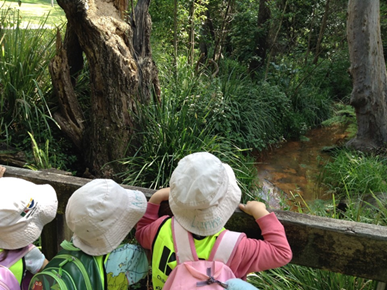Talking About Environments: Online Symposium
REGISTER NOW
Creating environments that support children’s learning is a key part of early childhood pedagogy. This is because the environment has a tremendous impact on children’s learning and wellbeing, and it influences how they think, feel, and behave. The best early childhood spaces are ones where children feel safe and secure, that interest and challenge and that invite children to explore, touch and engage. Creating such an environment takes time, thinking and planning. This virtual symposium brings together speakers who help us to think deeply about our environments and the connection between spaces, relationships, and children as active learners.
Each of the pre-recorded videos will be accompanied by a Reflection Guide which you can use to help facilitate team discussions about the video content.
This event is suitable for all early childhood professionals.
Talking about thinking in outdoor environments
Presenter: Janet Robertson
The outdoors is an irresistible place for thinking, playing and exploring. In this presentation we unlock pedagogy in which children’s thinking in the outdoors is made visible. Experiences of outdoor pedagogy which are open ended, flexible and dynamic and where children’s ideas and theories are explored will be discussed.
Designing indoor spaces: considering aesthetics
Presenter: Kirsty Liljegren
Aesthetics is about finding appreciation and beauty in our environments. In this presentation, we apply an aesthetic lens to early childhood indoor spaces and address questions such as:
- What is our understanding of aesthetics?
- How do aesthetics impact and influence the pedagogical process?
- What is the transformative nature of spaces?
- How do spaces affect our sense of engagement and wellbeing?
- How do we create a living space for all in the community that honours personal, visual, and sensual aesthetics?
Risk, Resilience, and Loose Parts Play – Parts 1 and 2
Presenter – Robin Christie, Childspace, Aotearoa/ New Zealand
Adult-supported and developmentally appropriate risky play is vital to children’s physical, emotional, social and cognitive development. Research from across the globe confirms the long-term benefits of such play, especially in the development of children’s resilience, the ability to ‘bounce back’ from negative experiences (Sandseter, 2006, 2007; Stephenson, 2006; Gill, 2007; Kvalnes, 2017).
Loose parts play involves open-ended and easily manipulated materials that children can use to construct, deconstruct and transport to develop their working theories of the physical world, and to augment their social and imaginative play. Since Simon Nicholson (1971) first formally described this natural aspect of children’s play, the ways in which we interpret loose parts play have widened considerably. Contemporary views shown in recent research perceive it as being completely without boundaries, and as mixing easily with other kinds of learning (Hewes, 2006; Neill, 2013).
This two-part presentation will examine practical instances of loose parts play using materials that are recovered, upcycled and drawn from nature. It will look at loose parts play opportunities in different spaces, and will explore their importance in symbolic and imaginative play. A special emphasis will be placed on loose parts play provisions that provide for adult-supported risky play, are environmentally responsible, encourage cooperation and problem-solving, and are cheap as chips!
Becoming environmentally responsible: Because we care
Presenters: Deb Watson and Fiona Harris
Together we will explore environmental responsibility and why it is important within early childhood. Reflecting upon the opportunity to apply an environmentally responsible lens to all seven quality areas of the National Quality Standards, participants will be offered a model to support environmental responsibility that emphasises critical reflection, genuine collaboration and embedded practice while being introduced to the 4 Big Ideas that may underpin our pedagogical work with young children.
The environment and children’s relationships
Presenters: Gianna Black and Megan Dodds
There is a relationship between the physical environment, social environment and children’s learning. If environments send ‘powerful messages’ to children, what messages do you want children to receive from the spaces that are created? This video explores this question and examines the impact of the environment on relationships, collaborative learning and social skills development.
Environments to support cultural and linguistic diversity
Presenters: Elly Nestler, FKA Children’s Services
Recognition and respect for languages other than English is of prime importance in early childhood environments. This is because home language plays a significant role in shaping each child’s identity. In this video we explore how to create an inclusive environment for children and families from culturally and linguistically diverse backgrounds.
Welcoming environments for Aboriginal and Torres Strait Islander children and their families
Presenters: KU Aboriginal and Torres Strait Islander Programs
Creating a culturally reflective environment gives Aboriginal and Torres Strait Islander children a sense of connectedness and belonging with their cultures and communities. Engagement is likely to be more effective when each child’s personal and cultural histories and beliefs are valued, respected, and determined by their family and local community. This video highlights the important role local cultures have on influencing culturally respectful opportunities for young children, exploring:
- relationships, expectations, and knowledges of families
- role of members of the local community
- the natural and physical environments
- the use of resources
- variances in play






